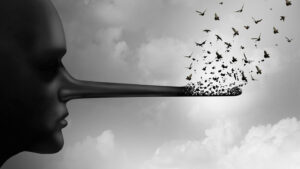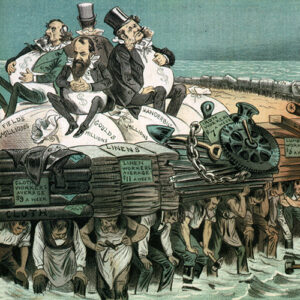The Second Coming
William Butler Yeats
Turning and turning in the widening gyre
The falcon cannot hear the falconer;
Things fall apart; the centre cannot hold;
Mere anarchy is loosed upon the world,
The blood-dimmed tide is loosed, and everywhere
The ceremony of innocence is drowned;
The best lack all conviction, while the worst
Are full of passionate intensity.
Surely some revelation is at hand;
Surely the Second Coming is at hand.
The Second Coming! Hardly are those words out
When a vast image out of Spiritus Mundi
Troubles my sight: a waste of desert sand;
A shape with lion body and the head of a man,
A gaze blank and pitiless as the sun,
Is moving its slow thighs, while all about it
Wind shadows of the indignant desert birds.
The darkness drops again but now I know
That twenty centuries of stony sleep
Were vexed to nightmare by a rocking cradle,
And what rough beast, its hour come round at last,
Slouches towards Bethlehem to be born?
So we’ve done this before. Let’s not do it again. The last two times it led to World War I and World War II, near annihilation and destruction.
Once again, democracy is on a razor’s edge. On one side of the razor lies the ideal of democratic governance, where every citizen has an equal say in how their society is run. On the other side lies the potential for chaos, corruption, and the erosion of democratic principles.
On one side we see the pillars of democracy: free and fair elections, a free press, an independent judiciary, and the rule of law–the essential ingredients that ensure power is held accountable. On the other side, the forces that threaten democracy: corruption, authoritarianism, demagoguery, apathy, and use of force to intimidate voters. These forces eat away at the foundations of democracy, slowly eroding its principles until they are no longer recognizable.
We the people must remain vigilant and engaged in our defense of democratic values. For the means to accomplish this end, the requirements are critical thinking, educated discourse, and the ability to engage personal philosophy rooted in morality, as well as the ability to recognize the emotional make-up of our opponents, and to meet this with measured, righteous passion of our own.
In modern society, it’s difficult to discern what’s real and what’s not in news media’s contemporary platforms and discussions.

Truth is difficult to define but having a correct theory or definition is not the problem. We all know many truths and untruths, without knowing what philosophers have said, and without knowing that many still disagree with each other.
The important things that a person needs to know are:
- Truth is different from absolute certainty.
- Absolute certainly is an impossible wish and goal. This is so even within mathematics. Bertrand Russell and Alfred Whitehead (Principia Mathematica) tried to prove that pure mathematics could be reduced to deductive logic. However, mathematician Kurt Gödel demonstrated the impossibility of this. “Gödel’s two incompleteness theorems are among the most important results in modern logic, and have deep implications for various issues. They concern the limits of provability in formal axiomatic theories. These results have had a great impact on the philosophy of mathematics and logic.”
- There have been many attempts by philosophers and religious leaders to establish absolute or infallible truth, ranging from Plato to Descartes to Kant to Husserl to authorities of Christianity, Islam, and innumerable cults.
- Among the great achievements of human beings over the past 400 years has been a rational understanding that no claim is beyond question. Some important names in this effort are David Hume (1711-1776), John Dewey (1859-1952), and Karl Popper (1902-1994).
- Roughly, at its core, truth refers to the state or quality of being in accordance with fact, reality, or actuality. It often signifies an agreement between a proposition or statement and the way things are in the world. Exact definitions and theories of truth are still disputed. Contrary to the convictions of most people throughout history, we don’t need absolute certainty to live good lives. A rough sense of the nature of truth is all we need. But we do need that.
- While we don’t need theories of truth, we do need to know how to find it. Part of this is having common sense, coherent families and communities, and trusted friends and elders.
- We also need science. We live in a time of expert technical knowledge. How many of us could make a cell phone? How about a pencil? That would require knowing how to get the metal and the graphite out of the ground, how to cut trees into pencil shapes, how to get the rubber for erasers, and put the things together.
- We need not only science but scientists. We have to be able to trust them, but of course today most work for corporations and who can trust them? We swim in seas of information and of disinformation. There is truth from corporations and there are lies. The internet purveys it all.
Our democratic hope is that collectively, through a free press, a strong educational system, a fair legal system, and the beautiful scientific process itself, which relies on the constant creative interplay of hypotheses and experiments, truth can be discovered.
It will always be a messy process, with opportunities for grifters with evil ideals–mafia bosses, financial advisors who steal from clients, and all manner of racketeering. Such people will lie about anything. If they have enough money, they will use the media for disinformation campaigns. Or they will amplify and fund evil messages like QAnon. The goal of such people is often to claim that there is no objective truth. We now know there is no absolute or infallible truth. But of course there is objective truth.

The contemporary Republican party is locked into a platform that relies on a constructivist/consensus theory of historical truth, a socially constructed, “Age of Innocence.”
The term “Age of Innocence” refers to a period in a society’s history when people are believed to have lived in a state of purity, simplicity, and moral virtue. It is often associated with nostalgia and idealization of the past, and the idea that there was once a time when life was better, more harmonious, and less complicated–a potent draw toward a belief system. The concept can be found in various forms throughout human history and across different cultures, often as part of mythological or religious narratives, such as the Garden of Eden in the Christian tradition or the Golden Age in Greek mythology.
Several reasons can explain why the notion of an Age of Innocence recurs in societies:
- Nostalgia encourages a tendency in people to idealize the past, recalling only the positive aspects and overlooking the difficulties and challenges. This selective memory can lead to a belief that there was once a time of innocence and simplicity.
- The concept can be used as a tool for critiquing contemporary society. By invoking the idea of a lost age of virtue, people can express dissatisfaction with present-day conditions and advocate for a return to more traditional values and practices.
- The idea can serve as a source of moral inspiration and guidance. By reflecting on the virtues and values of a bygone era, people can strive to emulate those qualities in their own lives and work towards creating a better society.
- The concept can be important for preserving a sense of cultural identity and continuity. It connects people to their past and helps to maintain a shared narrative that unites a community.
- Believing can provide psychological comfort, as it suggests that there was once a time when life was simpler, more harmonious, and free from the problems and anxieties of the present day.
It is important to note that the idea of an Age of Innocence is often a romanticized and idealized vision of the past that may not accurately reflect historical realities. However, it remains a powerful and enduring concept that continues to shape the way people think about history, society, and human nature.
If a country comes to support that vision, however, it is the end of democracy because there is no way to tell fact from fiction or know what’s real. The populace could then be easily manipulated by a potential demagogue.
People can be led to surrender.
“…for Trump Republicans,” Robert Reich says, “the ends justify whatever means they choose —including expelling lawmakers, rigging elections through gerrymandering, refusing to raise the debt ceiling, and denying the outcome of a legitimate presidential election.
“My friends,” he continues, “the Republican Party is no longer committed to democracy. It is rapidly becoming the American fascist party.”

Last month, Ralph Yarl, 16, went to the wrong address to pick up his younger siblings — 1100 NE 115th Street instead of 1100 NE 115th Terrace. After ringing 84-year-old homeowner Andrew Lester’s doorbell, Ralph was shot in the head and arm. Lester has told police he did not exchange words with the teen before he fired at him through a locked glass door, according to a probable cause document obtained by CNN. The homeowner said he thought Ralph was trying to break into the home and he was “scared to death” due to the boy’s size, according to the document. Lester’s grandson Klint Ludwig said he was disturbed by racial comments made by his grandfather in the past, including about Black people. He said his grandfather believed in right-wing conspiracy theories and was influenced by the “fear and paranoia” stoked by some right-wing media, which was often “blaring in his living room.”
Part of the problem is the lack of critical thinking engendered by the reliance on provocative and social media.
Professor James Engell, a stalwart of Harvard University’s English department, threw down the glove in a Harvard Magazine essay, in which he wrote: “By minimizing the arts and humanities, higher education exacerbates the problems confronting society. No one can interpret difficult texts, write sound treaties, examine conflicting testimony, or cut a path through the divisive, frequently false claims on social media without language and judgment sharpened by the humanities.”
A federal imprimatur: President Biden recently issued an executive order to promote the arts, the humanities, and museum and library services. He called them “essential to the well-being, health, vitality and democracy of our nation.”
If a society can acknowledge the truth, we can begin again because we know where we went awry. This is the hopeful moment for democracy because we can see clearly what is wrong and how we got “false prophets.”
State Representative Keturah Herron, a Democrat who represents part of Louisville, said on Twitter that “as we hold our community tighter,” there must also be “outrage and anger.”
These are my thoughts on what’s important today, why if we fail to agree on what’s right or what’s real or what’s true, we have a chance to lose our democracy. Democrats should get together and refuse to participate in a democracy gerrymandered beyond recognition.
“We live in a war zone and we shouldn’t have to,” [Herron] said.
As Yeats asked,
And what rough beast, its hour come round at last,
Slouches towards Bethlehem to be born?
If we have democratic ideals we can find our way. If we love the truth, and speaking the truth, we can work together against people of evil ideals.
What can be said at all can be said clearly, and whereof one cannot speak, thereof one must be silent. — Tractatus Logico-Philosophicus by Ludwig Wittgenstein.
Editor’s Note: A word about the cover design–each Sisyphus cover is good, but I want to make a note about the growth of our designer, Tyler Varian. Our covers seem to get better and better. This particular cover image was created by Dall-E with the prompt: “Democracy on a razor’s edge in the style of Pablo Picasso.”
Thanks for your thoughtful essay.